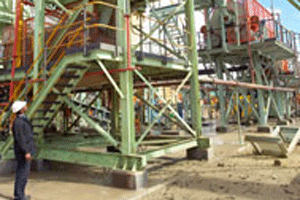
BY MTHANDAZO NYONI
WORKERS in Zimbabwe’s mining industry are working in a volatile environment reminiscent of the dark days during the Ian Smith era where blacks were treated like slaves, unions have said.
The employees work long hours, but take home little income. They also reportedly endure harassment and beatings at the hands of their employers, some of them of foreign nationals.
Unfair labour practices, dismissals as well as sexual abuse of female workers at their workplaces are allegedly rampant, but no one comes to the rescue of these downtrodden employees.
In fact, the victims of this abuse are often arrested on baseless allegations meant to silence them, while the perpetrators are let scot-free, according to the Zimbabwe Diamond and Allied Minerals Workers’ Union general secretary, Justice Chinhema.
“Abuse of workers in the mining industry is very rampant. This is being perpetrated mostly by Chinese nationals and our black indigenous people who are politically-connected. We cannot isolate them,” Chinhema said.
“Workers earn RTGS$5 per week per 12-hour shift. When you ask why people are earning such little money, you are told ‘we are connected in the high offices’.
“You find a person pointing to a portrait of the president of this country and we have said this must stop. That nonsense is not acceptable.”
- Chamisa under fire over US$120K donation
- Mavhunga puts DeMbare into Chibuku quarterfinals
- Pension funds bet on Cabora Bassa oilfields
- Councils defy govt fire tender directive
Keep Reading
Chinhema said one employee working for a Chinese company was beaten up by a Chinese manager and as a result, his private parts were damaged.
“The employee in question stayed at Gweru General Hospital for three months,” he said.
“He was injured by a Chinese manager because he had refused to work under unhealthy conditions.
“These abuses are happening every day and as a trade union we have said we need to intervene so that this comes to an end.”
Chinhema said they were engaging the Chinese embassy over the matter.
A number of Chinese companies in the country have been accused of abusing workers, including paying low salaries and physically assaulting employees.
In 2016, the Zimbabwe Diamond Miners Workers’ Union dragged the Chinese-owned Detroop Mine near Chinhoyi to the National Employment Council (NEC) over unfair labour practices, non-payment of overtime, assault of employees, underpayment of wages and lack of safety clothing.
In the same year, workers at a Chinese-controlled mine near Doneni, Muzvezve, in Kadoma, also complained of ill-treatment, non-payment of salaries and violation of safety procedures.
National Union of Mine, Quarry Iron and Steel Workers of Zimbabwe (Numqiswz) regional manager Abraham Kavalanjila said a number of cases had been reported to the NEC for the mining industry and Labour Court involving the Chinese nationals and individuals.
However, these cases had died a natural death as the concerned foreign nationals were politically connected.
“Even the verdicts in these cases are not being delivered on time. Some even take almost two years to be made. Some workers have died without getting their benefits,” Kavalanjila said.
“Workers in the mining sector in Zimbabwe are suffering.
“Unions should be united and fight with one voice. We should stop fighting for positions.”
Another Numqiswz official, Shadreck Pelewelo, said legislators, police officers, judges as well as ministers owned mines, which made it difficult to fight the abuse.
Efforts to get a comment from Chinese ambassador to Zimbabwe Guo Shaochun were fruitless as he requested that an application letter be written requesting an interview with him.
But in 2012, former Chinese ambassador to Zimbabwe, Lin Lin told state-controlled media that Chinese investors and citizens should not be spared if they break laws in Zimbabwe.
Mines and Mining Development permanent secretary Onesimo Moyo said: “Right now I’m at the airport and about to board an aeroplane. It could be difficult for me to comment.”
Public Service, Labour and Social Welfare minister Sekai Nzenza requested questions in writing, but she had not yet responded by the time of going to print. Mining accounts for more than two-thirds of Zimbabwe’s export earnings, but workers in the sector continue wallowing in abject poverty.
The mining sector, which government intends to grow from a $3 billion to a $12 billion sector by 2023 through a battery of interventions across minerals, is estimated to account for between 12% and 16% of the GDP.
Chinhema said since the mining industry was one of the biggest foreign currency earners, workers should be paid in hard currency.
“We are saying the mining industry is the number one producer of foreign currency, we have got diamonds, chrome, platinum — that is cash and it’s foreign currency and how do you now pay people in RTGS$ when you are producing foreign currency?” he said.
“So the mining workers must be earning the US$ component equivalent to what the employer returns after selling his minerals.
“That’s the benchmark we are talking about and it should be US$790, which is the poverty datum line from the central statistics agency.”
Recently, workers in the mining industry were awarded an 80% salary increment following collective bargaining negotiations, but Chinhema said a number of mining companies had asked for exemption, preferring to pay workers paltry salaries.
A mine worker, Marshal Dube, pleaded with government to come to their rescue.
“Our fathers suffered under the Ian Smith regime and we are now suffering under the current government,” he said.
“We report these labour malpractices to the police and NEC, but there is no recourse.
“Whom should we turn to if our government is turning a blind eye on us? Surely, we are doomed.”










